Hino Motors expands Marion axle plant, invests $280 million in new production line for Toyota trucks
by May 12, 2017 12:15 pm 2,515 views

Top Hino Motors Corp. and local and state economic development officials today (May 12) launched the expansion of a 110,000 square feet production line at the Japanese auto part giant’s sprawling facility in Marion, Arkansas. New workers hired since 2013 will manufacture rear axles and front knuckle assemblies for Toyota Tacoma trucks, company officials said.
Hino Motors made the decision four years ago to locate its Toyota business unit operation in east Arkansas, bringing Toyota Tacoma axle and suspension products to Marion. To prepare for the Tacoma project, Hino has expanded its Marion plant production space by 110,000 square feet, adding new office space, a cafeteria, and a state-of-the-art training center.
“This was a big challenge for Hino and required much preparation. This is a truly great success story, and we could not have achieved this without all of you,” Hino President Takashi Ono said at the company’s dedication in Marion.
The event was attended by top Hino officials from Japan and the U.S., along with Japanese trade officials and a contingent of economic development officials. Danny Games, executive vice president of the Arkansas Economic Development Commission’s global outreach team, represented the state of Arkansas.
Over the course of two years, Hino has purchased, transferred and installed additional production equipment in Marion, and hired and trained over 300 full-time Hino workers for the Tacoma project. In January 2017, Hino began its first production of full rear axle assemblies for the popular Toyota full-sized pickup.
In addition to Toyota Tacoma axle and suspension products, suspension components for the Toyota Sequoia, stampings for the Toyota Corolla, and frame rails for Class 6 and 7 Hino trucks are already in production at the facility. Hino’s Arkansas workers now produce approximately 1,000 Tacoma rear axle assemblies each day, company officials said.
“Hino’s investments in the Marion plant are not only investments in physical space and equipment for the demands of today – but they are also investments in the future of Hino, Arkansas,” said Ono. “Our goal is to continue to strengthen our relationship with our customer, Toyota, and to continue to flourish. And with the increasing skill level of our team members and our ongoing commitment to produce quality products.”
Ono said the Marion facility now has approximately 563,000 square feet of manufacturing and office space. Hino’s capital investment in the Marion plant and equipment, including over 550 major machines, now exceeds $280 million, he said.
Hino Motors first landed in the Arkansas Delta following the state’s highly-publicized recruitment of the $800 million Toyota Tundra plant that went to San Antonio, Texas in 2003. Hino Motors Manufacturing USA, which is a wholly owned subsidiary of Hino Motors and the Toyota Group Company, opened the Marion plant in early 2006 with an initial investment of $280 million and an employment target of 600 employees.
Since then, the Marion plant has continually increased production, making axles and related parts for Toyota’s Tundra, Tacoma and Sequoia brand pickups and Hino’s own uniquely designed trucks and flatbeds. Today, the AEDC lists Hino as the largest manufacturer in the Crittenden County area.
The Hino expansion follows Wednesday’s announcement by Gov. Asa Hutchinson at the State Capitol that China’s largest cotton textile manufacturer planned to invest $410 million to retrofit a 1.4 million square foot cotton-spinning, garment factory in Forrest City. Ruyi Technology Group, located in the Shandong province of China, said it plans to locate its’ first manufacturing operation in North America, creating up to 800 jobs at an average pay of $15 an hour at the vacant Sanyo Electronics plant in the Delta city.
Both the Hino expansion and Ruyi’s cotton gin factory were borne out of two Far East trade missions that Hutchinson, AEDC Director Mike Preston and other state economic development officials made in 2013 and 2015, visiting businesses and government officials across several major cities in Japan and China.
Hutchinson has said that he hopes his “Shandong” and Far East connections will bring more jobs to the Delta and south Arkansas. Sun Paper Co. and Suzhou Tianyuan Garments Co., two other Chinese companies from the Shandong province, have announced major economic development projects over the past 12 months in Arkadelphia and the Little Rock river port, respectively.
